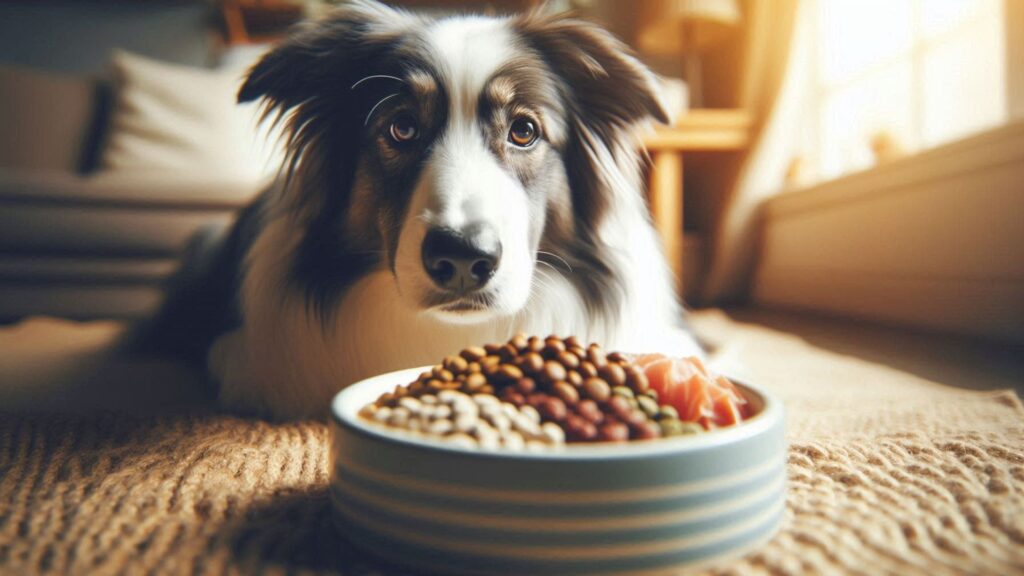Adverse food reactions (AFR) in dogs refer to abnormal responses to food that’s usually considered normal for them.
There are two main types of AFRs in dogs: food allergies, which involve the immune system, and food intolerances, which don’t involve the immune system.
Although the causes are different, food allergies and intolerances in dogs often show similar symptoms and are diagnosed in similar ways. They are usually treated the same way too—by changing the dog’s diet, like switching to a hydrolyzed protein diet.
What Are Food Allergies in Dogs?
Food allergies in dogs happen when their immune system reacts to certain ingredients in their diet—usually proteins they’re allergic to. These reactions often develop gradually, rather than immediately after trying a new food.
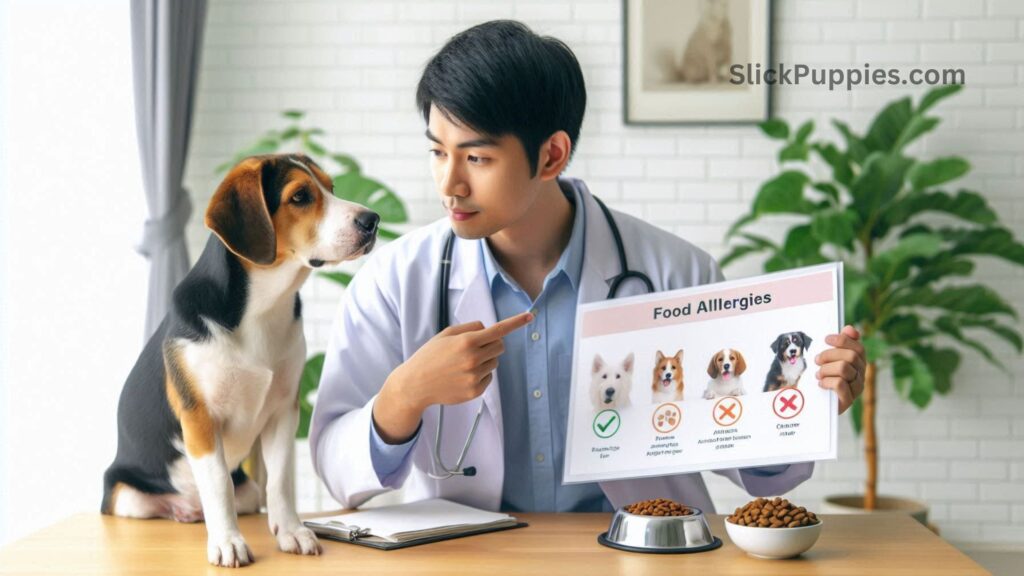
The most common food allergens for dogs are proteins, like chicken, beef, and dairy.
When a dog with a food allergy eats something they’re allergic to, their immune system treats that protein as a threat and starts attacking it.
This can cause skin issues like itching, redness, and swelling, as well as digestive problems like vomiting, diarrhea, and gas.
Food allergies in dogs are actually pretty rare compared to environmental allergies like seasonal allergies or flea/tick allergies. Only about 0.2% of dogs have food allergies.
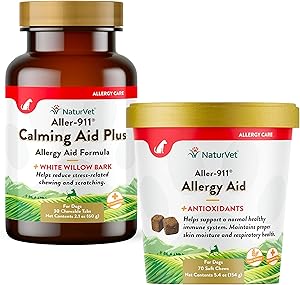
NaturVet Aller-911 Calming Aid & Allergy Aid Dog Supplement
NaturVet Aller-911 Calming Aid & Allergy Aid Dog Supplement supports allergy relief and promotes relaxation, easing discomfort from seasonal allergies and stressful situations in dogs.
Also Read: What is the Best Puppy Shampoo for Sensitive Skin?
What Is Food Intolerance in Dogs?
Food intolerance doesn’t involve the immune system, and it can happen right away or develop over time.

In these cases, it’s usually a specific ingredient, like a protein, that’s causing the problem. It’s similar to how people can be lactose intolerant.
The main difference between food allergies and food intolerance is that dogs with food intolerance might be okay with small amounts of the problem food. But with a true food allergy, even a tiny amount of the allergen can trigger a reaction.
Symptoms of Food Intolerance and Food Allergies in Dogs
The symptoms of dog food allergies and food intolerance are very similar and can include:

Skin Symptoms (for both allergies and intolerance):
- Itchy or red skin
- Frequent ear or skin infections
- Hair loss
- Licking or chewing feet (look for brown staining on the paws)
GI Symptoms (for both allergies and intolerance):
- Diarrhea
- Vomiting
- Excessive gas (flatulence)
- Weight loss
- Low energy or lethargy
Anaphylaxis (only in food allergies, rare):
- Hives
- Swelling of the face
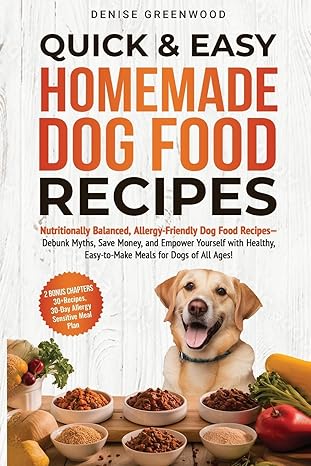
Quick & Easy Homemade Dog Food Recipes
Quick & Easy Homemade Dog Food Recipes offers simple, nutritious meals for dogs, featuring easy-to-follow instructions and wholesome ingredients for healthy, happy pets.
Also Read: How to Make My Puppy Sleep Through the Night?
Causes of Food Allergies and Food Intolerance in Dogs
Food allergies and intolerances in dogs might have a genetic link, but we don’t fully understand why some dogs develop them while others don’t.

Dogs can show signs of allergies or intolerances early in life, or they might develop them later on.
Though any breed of dog can experience allergies or intolerances at any age, some breeds seem to be more prone, like Labrador Retrievers, West Highland White Terriers, and Cocker Spaniels.
Certain ingredients are more often associated with food allergies and intolerances in dogs. Proteins are the most common culprit. Some of the most common food allergens or intolerances include:
- Chicken
- Beef
- Dairy
- Wheat
- Soy
- Eggs
How Veterinarians Diagnose Food Allergies and Food Intolerance in Dogs
There isn’t a specific test to diagnose food allergies in dogs. Blood tests available right now are considered unreliable. Instead, vets usually diagnose food allergies and intolerances based on a physical exam, symptoms, and how the dog responds to a food trial.

Your vet might suggest doing a food trial with your dog. These trials typically last 8 to 12 weeks, and it’s important to follow the plan exactly as prescribed. During the trial, avoid giving your dog any treats, other food, or snacks that could mess with the results.
Make sure to talk to your vet about the best heartworm and flea/tick prevention products to use during this time, as many contain beef or chicken protein for flavor.
There are a few ways to approach a food trial:
- Hydrolyzed protein diets: These foods have proteins broken down into tiny particles so they can’t trigger an immune response.
- Novel protein or carbohydrate diets: These foods contain unusual protein or carbohydrate sources and fewer ingredients, making it less likely to cause a reaction.
- Skin support diets: These are enriched with special nutrients to help reduce the immune system’s response.
Food trials are the most reliable way to figure out if your dog has food allergies or intolerances. While there are diagnostic tests available, many still question how accurate they are.
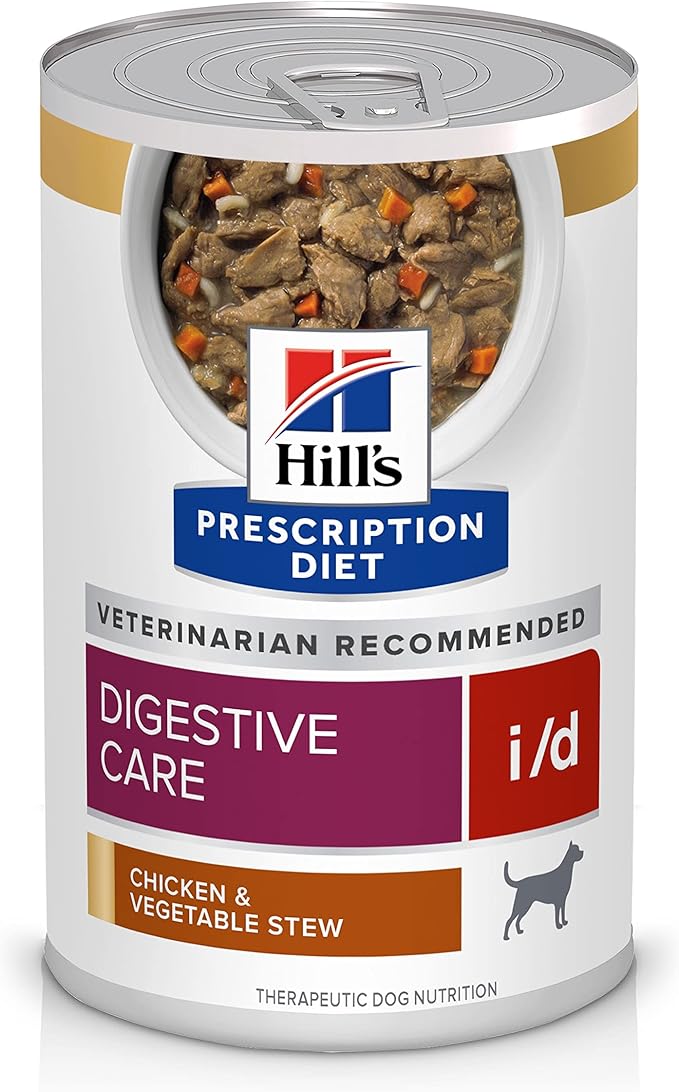
Hill’s Prescription Diet i/d Digestive Care Chicken & Vegetable Stew Canned Dog Food
Hill’s Prescription Diet z/d Food Sensitivities Dog Food helps manage food allergies and sensitivities with easily digestible ingredients for a healthy, balanced diet.
Also Read: What are the Best Foods for Puppies with Sensitive Stomachs?
Treatment of Food Allergies and Food Intolerance in Dogs
Most food allergies and intolerances in dogs can be managed well with the right diet change.

Best Diet for Dogs With Food Allergies
There are many diets available to help manage your dog’s food allergies. However, allergies are unique to each dog, so there’s no one-size-fits-all diet. The best food for your dog is one that doesn’t include any ingredients they’re allergic to, while also being balanced and designed for their overall health.
Many food options for allergies are considered therapeutic diets, which means they need approval from your vet. This ensures that the ingredients are safe and won’t cause any problems for your dog.
These diets have strict protocols to prevent cross-contamination, because even tiny amounts of the allergen can trigger a reaction.
One example of a brand offering therapeutic diets is Blue Buffalo™. With a vet’s authorization, they offer:
- Blue Natural Veterinary Diet™ HF Dog Food: This food uses hydrolyzed salmon, meaning the protein is broken down into such tiny pieces that your dog’s immune system won’t recognize it as a threat.
- Blue Natural Veterinary Diet NP Dog Food: This one uses alligator protein, a good choice for dogs with allergies to poultry, red meat, or other animal proteins.

